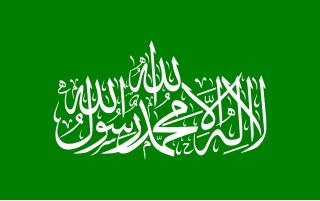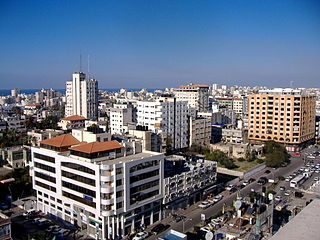
Mahmoud Abbas, also known by the kunya Abu Mazen, is the President of the State of Palestine and Palestinian National Authority. He has been the Chairman of the Palestine Liberation Organization (PLO) since 11 November 2004, and Palestinian president since 15 January 2005. Abbas is a member of the Fatah party and was elected Chairman of Fatah in 2009.
The Fatah–Hamas conflict, also referred to as the Palestinian Civil War, was a conflict between the two main Palestinian political parties, Fatah and Hamas, resulting in the split of the Palestinian Authority in 2007. The reconciliation process and unification of Hamas and Fatah administrations has not finalized as of May 2018.
Events in the year 2010 in the Palestinian territories.
Events in the year 2009 in the Palestinian territories.
Events in the year 2008 in the Palestinian territories.
Events in the year 2007 in the Palestinian territories.
Events in the year 2011 in the Palestinian territories.
The Fatah–Hamas Doha Agreement was a reconciliation attempt between Fatah and Hamas, signed on 7 February 2012. The parties agreed to form an interim national consensus government composed of independent technocrats, to prepare for upcoming elections. It would be led by Palestinian Authority President Mahmoud Abbas. The envisioned government did not materialize.
Events in the year 2012 in the Palestinian territories.

The governance of the Gaza Strip is carried out by the Hamas administration, led by Ismail Haniyeh, from 2007, until 2014 and again from 2016. The Hamas administration is often referred to as the Hamas government in Gaza.
The Palestinian Authority government in the West Bank refers to the government body of the Palestinian National Authority, seated in Ramallah from 1994 until its split in 2007, and finally the rebranding into the Government of the State of Palestine in 2013.

Rami Hamdallah is a Palestinian politician and academic. He is the Prime Minister of the Palestinian National Authority and president of An-Najah National University in Nablus.
The Battle of Gaza, also referred to as Hamas' takeover of Gaza, was a military conflict between Fatah and Hamas, that took place in the Gaza Strip between the June 10 and 15, 2007. It was a prominent event in the Fatah–Hamas conflict, centered on the struggle for power, after Fatah lost the parliamentary elections of 2006. Hamas fighters took control of the Gaza Strip and removed Fatah officials. The battle resulted in the dissolution of the unity government and the de facto division of the Palestinian territories into two entities, the West Bank governed by the Palestinian National Authority, and Gaza governed by Hamas.

The Palestinian governments of 2013 were two Palestinian governments established respectively in June and September 2013. They ruled de facto over the West Bank only.

The Fatah–Hamas reconciliation process refers to a series of reconciliation attempts to resolve the hostility between Fatah and Hamas since the 2006–2007 Fatah–Hamas conflict and Hamas' subsequent takeover of the Gaza Strip.

The Palestinian Unity Government of June 2014 was a national unity government of the Palestinian National Authority under Palestinian President Mahmoud Abbas formed on 2 June 2014 following the Fatah-Hamas Reconciliation Agreement that had been signed on 23 April 2014. The ministers were nominally independent, but overwhelmingly seen as loyal to President Abbas and his Fatah movement or to smaller leftist factions, none of whom were believed to have close ties to Hamas. However, the Unity Government was not approved by the Legislative Council, leading to its legitimacy being questioned. The Unity Government dissolved on 17 June 2015 after President Abbas said it was unable to operate in the Gaza Strip.













